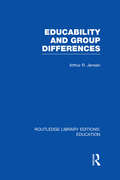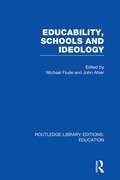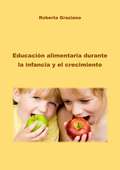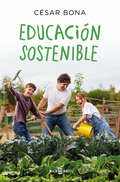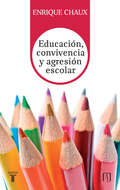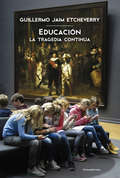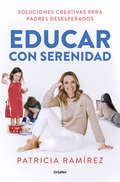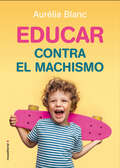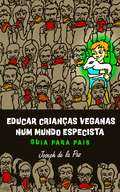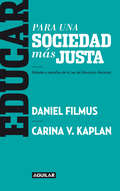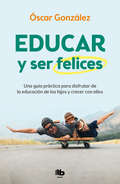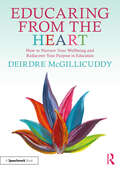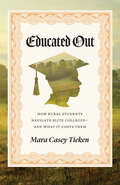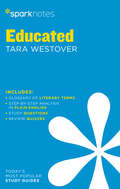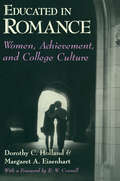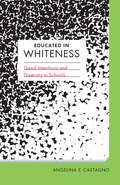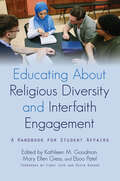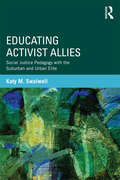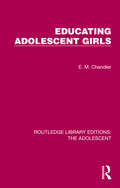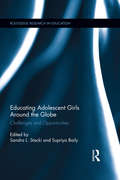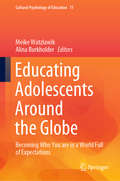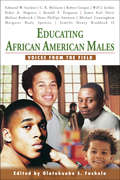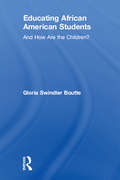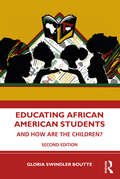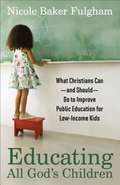- Table View
- List View
Educability and Group Differences (Routledge Library Editions: Education)
by Arthur JensenJensen is a controversial figure, largely for his conclusions based on his and other research regarding the causes of race based differences in intelligence and in this book he develops more fully the argument he formulated in his controversial Harvard Education Review article ‘How Much Can We Boost IQ and Scholastic Achievement?’. In a wide-ranging survey of the evidence he argues that measured IQ reveals a strong hereditary component and he argues that the system of education which assumes an almost wholly environmentalist view of the causes of group differences capitalizes on a relatively narrow category of human abilities. Since its original publication the controversy surrounding Jensen’s ideas has continued as successive generations of psychologists, scientists and policy-makers have grappled with the same issues.
Educability, Schools and Ideology (Routledge Library Editions: Education)
by John Ahier Michael FludeThe sociology of education has been at the forefront of new developments in sociological theory. This book examines and criticizes a number of these new developments and discusses some empirical work on issues of current concern. One of the few books that integrates radical and critical sociology into the field of education, it deals with the resultant difficulties. The topics covered include cultural deprivation, ideologies in education, classrooms, the teaching profession and the history of women’s education.
Educación alimentaria durante la infancia y el crecimiento
by Roberta Graziano Audrey Hawes MayayoEn los últimos años se habla cada vez más de la "globesidad", la nueva epidema general de obesidad y sobrepeso que afecta a millones de personas, de la que no se salvan los niños ni los adolescentes. Su alcance es tal que la Organización Mundial de la Salud ha empezado a tomar cartas en el asunto. Si no se le pone freno inmediatamente se verá afectada seriamente la salud de millones de chicos.
Educación sostenible
by César BonaPodríamos preguntarnos si este es el mundo que vamos a dejar a las futuras generaciones, pero este no es un libro sobre lo que va a pasar en el futuro, es un libro sobre el presente. La educación es la pieza clave para cuestiones tan actuales como la sostenibilidad o el cambio climático. Invitemos a niños y niñas a que sean los principales protagonistas de un cambio en el cual nosotros, adultos, tenemos que ser los primeros en creer. Así que demos el paso y sirvamos de ejemplo. Preguntémonos: «¿Qué puedo hacer yo?» y, sobre todo, «¿Qué podemos hacer juntos?» En casa, en la escuela, de forma individual y en grandes equipos. Pequeños gestos y acciones del día a día han de provocar ese cambio. Hemos de actuar, no por miedo a qué pasará si no lo hacemos sino porque con nuestras acciones estaremos respetando el lugar donde vivimos, nuestra casa. César Bona (Ainzón, Zaragoza, 1972). Maestro y escritor. Licenciado en Filología Inglesa y Diplomado en Magisterio en Lengua Extranjera por la Universidad de Zaragoza. «Las puertas de las escuelas han de estar abiertas, no solo para que entren los niños y las niñas sino para que sus ideas salgan y transformen el mundo». Pensamientos como este son los que le llevaron al Congreso Mundial por los Derechos de la Infancia, en el XXV Aniversario de la Convención de los Derechos del Niño. Por sus múltiples proyectos vinculados a la participación infantil recibió el Premio Magister de Honor por la Plataforma de la Escuela Pública, el Premio Crearte del Ministerio de Cultura en dos ocasiones por estimular la creatividad, así como también la Cruz José de Calasanz, máxima distinción en la educación aragonesa o el Premio Medio Ambiente Aragón 2013. Además, obtuvo la Mención de Honor en el International Children Film Festival of India, por la película de cine mudo The importance of being an Applewhite, que consiguió unir a dos familias que no se hablaban. Y tras dieciséis años de trayectoria, fue nominado como uno de los 50 mejores maestros del mundo según el Global Teacher Prize (2014). Ha formado parte del jurado de los premios Princesa de Asturias, en la categoría de Comunicación y Humanidades, en 2017, 2018 y 2019. Entresus libros destacan La nueva educación (2015), Las escuelas que cambian el mundo (2016), La emoción de aprender (2018) y Humanizar la educación (2021), libros que ahora sirven de referencia en muchas universidades. Además, para niños ha escrito Derechos y deberes de la Infancia (2019), El asombroso mundo de Bernardo (2018) y una adaptación del Quijote (2017).
Educación, convivencia y agresión escolar
by Enrique ChauxUna investigación sobre problemas que afectan a los jovenes.
Educación: la tragedia continúa
by Guillermo Jaim EtcheverryDos décadas después de la publicación de La tragedia educativa, Guillermo Jaim Etcheverry invita nuevamente a reflexionar sobre la educación en la Argentina, esta vez, prestando especial atención al efecto que los cambios sociales y tecnológicos han ejercido en nuestros niños y jóvenes. En 1999, Guillermo Jaim Etcheverry escribió un libro que se convertiría en clásico: La tragedia educativa, un lúcido diagnóstico de las causas del fracaso de nuestro sistema educativo. Al cabo de dos décadas y advirtiendo las profundas transformaciones que ha experimentado nuestra cultura ante el impacto de la revolución digital, considera oportuno invitar al lector a volver a acompañarlo en un viaje por la realidad de la educación actual. ¿Qué revelan las últimas evaluaciones de la calidad educativa? Los ejemplos familiares y sociales, ¿estimulan a los jóvenes a entusiasmarse con el estudio y la lectura? ¿Constituye un derecho de los niños el ser exigidos? ¿Cómo influye, en el proceso de aprendizaje, la pérdida de la capacidad de atención provocada por las tecnologías de la comunicación? ¿Es posible revertir la tragedia? En esta nueva aproximación al problema, que aún persiste, el autor actualiza estadísticas sobre cuestiones esenciales de la educación en nuestro país y analiza su relación con el mundo, enuncia estrategias para encarar cambios indispensables y sugiere una misión posible para la escuela de hoy.
Educar con serenidad: Soluciones creativas para padres desesperados
by Patricia RamírezLos padres y las madres nos tomamos la educación muy en serio, pero debemos dejar de copiar antiguos modelos para empezar a innovar, ser creativos y pensar que existe otra forma de educar sin recurrir a los gritos y a la figura de autoridad. Y, sobre todo, sin desesperarnos. ¿Qué padres y madres no han sentido alguna vez desesperación ante el reto de lidiar con los conflictos cotidianos con sus hijos e hijas? ¿Quién no ha estado al borde de un ataque de nervios cuando los niños tienen que ducharse, obedecer, ser más responsables, menos contestones, más obedientes, más empáticos, menos nerviosos o mejores comedores? Para cada una de esas situaciones, Educar con serenidad ofrece un remedio al alcance de cualquiera. Son soluciones creativas, fáciles de llevar a la práctica y respaldadas científicamente, fruto de la amplia y reconocida experiencia de Patricia Ramírez como psicóloga y, en particular, del taller donde aborda las inquietudes y los miedos de los padres preocupados por la educación de sus hijos. De su mano, descubriremos esas ideas que no se nos ocurren porque no encontramos tiempo:- Jugaremos a educar, a recoger o a inventarnos concursos para aumentar así la motivación de los chavales mientras se divierten. - Descubriremos cómo entrenar la capacidad de autocontrol, la nuestra y la de nuestros hijos. - Aprenderemos a sentir y a vivir las emociones, y a comunicarnos y a entendernos mejor. - Y también educaremos en valores para proporcionar a nuestros hijos una filosofía de vida que les permita convertirse en hombres y mujeres de bien. La autora destinará parte de los ingresos de las ventas de este libro a distintos proyectos que la ONG Cooperación Internacional desarrolla en Zaragoza.
Educar contra el machismo
by Aurélia BlancEl primer libro de educación no sexista para niños. Un libro que lleva el feminismo a la vida familiar. Durante décadas, hemos reflexionado sobre el significado de la feminidad, sobre la educación de nuestras hijas en el feminismo, a quienes queremos ver orgullosas y emancipadas: luchamos en la escuela, en la calle, en la familia, para darles las mismas oportunidades que a los niños y para combatir los clichés. Pero seguimos criando a nuestros hijos bajo el mismo molde patriarcal que antes, como si pudiéramos deconstruir el sexismo sin preguntarnos acerca de la masculinidad. A través de estudios científicos y testimonios de profesionales, Aurélia Blanc, madre joven y periodista, reúne todas las herramientas para ayudar a los padres a criar a sus hijos de una manera igualitaria en cuanto al género. Blanc describe cómo nuestros hijos, encerrados con viejos grilletes masculinos, sufren la represión de su ser, sus sentimientos y sus deseos reales. Adoptar una educación feminista es dar a nuestros hijos la oportunidad de desarrollar su singularidad y cultivar la verdadera libertad. Un libro que da las claves para crear niños felices, libres y que vivan la igualdad como el único camino y que detecta y examina las bases del «sexismo benevolente» que desafortunadamente aún vivimos, ofreciéndonos las bases para romper ciertos roles impuestos e ideas machistas conscientes e inconscientes, evitando que contaminen nuestro imaginario y el de nuestros pequeños. Un libro que educa en la igualdad, en la vida afectiva y sexual y en la lucha contra la influencia negativa de los estereotipos, que ayudará a los padres a que sus hijos cuestionen su entorno y aprendan a responder ante actitudes sexistas, aprendiendo sin tabúes en una educación que favorezca el encuentro con la otredad.Un libro fundamental para que tu hijo se respete a sí mismo y a todos los demás y para que se convierta en un hombre libre.
Educar crianças veganas num mundo especista: Guia para pais
by Joseph de la Paz Maria"Quando embala o seu bebé, tem literalmente o futuro da humanidade nas suas mãos". Criar os nossos filhos de acordo com os nossos valroes devia ser a coisa mais natural e simples do mundo. Contudo, viemos numa sociedade que vê o veganismo com suspeição e que continua imersa em mitos especistas e nutricionais fruto do passado. Por isso, nós que somos mães e pais veganos, enfrentamos uma infinidade de situações diversas que exigem que tenhamos uma preparação especial. Este livro oferece apoio teórico e prático a esses pais. Não se centra na nutrição - apenas existe um capítulo com regras e conselhos gerais a esse respeito -, mas em todos os aspetos educativos, emocionais e sociais associados a ter um filho e a educá-lo sem trair as nossas crenças. Depois de dois anos a conversar e a entrevistar centenas de mães e pais veganos de todo o mundo, a interagir com as crianças do infantário onde trabalha e a ver as suas duas filhas crescer, o autor apresenta um livro direto, cheio de informações e inspiração. Nele poderá encontrar: •como otimizar o ambiente social em que o nosso pequeno irá crescer •como transmitir uma educação humana integral, coerente com o veganismo •como incutir os valores da igualdade animal e o respeito pela vida e pela liberdade •como completar o círculo com uma correta consciencialização acerca da nutrição e do respeito pelo meio ambiente •como explicar o veganismo e o especismo a uma criança •como resolver situações do dia-a-dia na escola, no parque ou em casa dos avós •como fazer a transição para o veganismo quando os seus filhos já comeram produtos de origem animal •como enfrentar a situação se o seu parceiro não for vegan •conselhos práticos de mães, pais e filhos veganos de diversos países •recursos úteis, desde informação nutricio
Educar para una sociedad más justa: Debates y desafíos de la Ley de Educación Nacional
by Daniel Filmus Carina V. KaplanAnálisis, debates y propuestas en torno a la Ley de Educación Nacional La historia de la educación argentina registra algunos hitos fundantes como la ley 1420 de educación universal, obligatoria y gratuita de 1884, la reforma universitaria de 1918, la gratuidad de la enseñanza universitaria de 1949. En esa breve lista debe ser incluida, sin dudas, la Ley de Educación Nacional de 2006. Por su contenido, por la forma en que fue discutida y aprobada, por su perspectiva de futuro. Porque como toda política de Estado, la Ley de Educación Nacional no fue concebida para la coyuntura sino para perdurar, pensada como complemento indispensable de un modelo de país productivo, inclusivo e igualitario que demanda una política educativa que asegure al conjunto de la población el acceso a una formación de calidad. Daniel Filmus y Carina Kaplan nos brindan el relato de un proceso inédito en la historia argentina, desde la amplia y enriquecedora discusión desplegada por la comunidad educativa y el conjunto de la sociedad hasta la expresión de ese debate en el Congreso, que culminó con la aprobación de la ley por amplia mayoría. Educar para una sociedad más justa es insoslayable, tanto para quienes se interesan por la problemática educativa como para todo apasionado por la política y los cambios sociales. Unos y otros encontrarán aquí certeros análisis sobre el rol de los sistemas educativos, sus vínculos con las transformaciones económicas y sociales, además de una mirada integral sobre uno de los momentos de cambio más profundos en la historia del país. Incluye textos de Amanda Isidori, Juan Carlos Tedesco, Adriana Puiggrós, Silvina Gvirtz, Blanca Osuna y Alberto Sileoni, y un prólogo de Bernardo Kliksberg.
Educar y ser felices: Una guía práctica para disfrutar de la educación de los hijos y crecer con ellos
by Óscar González¿Alguna vez te has angustiado por si lo estás haciendo bien?¿O te has sentido culpable por no haber sido un padre perfecto? Libérate del miedo y déjate llevar por la emocionante aventura de educar a tus hijos. Todos queremos criar hijos felices, sanos y exitosos, pero llevarlo a la práctica es algo más complicado. A medida que avanzamos en la crianza, descubrimos un sinfín de consejos contradictorios que nos pueden llevar a hacernos sentir culpables y frustrados. Hoy, más que nunca necesitamos padres conscientes que desarrollen una profunda conexión con sus hijos. Este libro nos enseña que no hay una «forma correcta» de educar y ofrece las herramientas necesarias para despojarnos de todo complejo, liberarnos de falsas creencias y, sobre todo, ayudarnos a educar desde la tranquilidad, la calma y la serenidad. Reseñas:«Para escribir sobre educación hay que tener inteligencia, información y entusiasmo. Tres cosas que Óscar González demuestra tener.»José Antonio Marina «Para quienes somos activistas educativos, contemplar el paso firme de Óscar González, nos llena de esperanza.»Javier Urra
Educaring from the Heart: How to Nurture Your Wellbeing and Re-discover Your Purpose in Education
by Deirdre McGillicuddyInviting readers on a journey of self-reflection, Educaring from the Heart offers an approach to education which places care, empathy, and compassion at the core of the educator’s role.Within the book, the reader is introduced to the principles underpinning educaring from the heart and encouraged to consider their own positionality when reflecting on the role they play in supporting both the learning and wellbeing of their students. Practical exercises are woven throughout to allow the reader to critically engage with how they understand themselves and their values as educators, and how this then shapes their wellbeing and practices in the classroom.The book is divided into three distinct sections: The “I” as Educator The “Us” as Educator and Student The “We” as Cocreators for Wellbeing With a focus on nurturing wellbeing and learning within the classroom, as well as the power of co-creativity, this book is an essential read for any educator seeking to re/discover their purpose within education and to foster positive outcomes for their students.
Educated Out: How Rural Students Navigate Elite Colleges—And What It Costs Them
by Mara Casey TiekenThrough the stories of nine rural, first-generation students and their families, Educated Out shows how geography shapes college opportunities, from admission to postgraduation options. A former third-grade teacher in rural Tennessee, education researcher Mara Casey Tieken watched as her former students graduated high school. She was shocked at how few were heading to college—and none were going to elite four-year schools. These students were representative of a larger national phenomenon: In 2021, 31 percent of rural adults aged twenty-five and older held a postsecondary degree, compared to 45 percent of urban adults, and rural students are especially unlikely to pursue degrees from private, selective schools. Why, Tieken wondered? And what happens to the handful of rural students who do attend elite colleges, colleges that may feel worlds away from home? Tieken addresses these questions in Educated Out—a study that shows how geography shapes rural, first-generation students’ access to college, their college experiences, and their postgraduation plans and opportunities. Tieken closely follows a group of nine students for their college years and beyond at an elite New England private school that she calls Hilltop. Interviews with these students reveal the critical moments in the students’ educational careers when their rural origins mattered most: when applying to college, she shows how students are hindered by limited college counseling resources. Once on campus, they learn that many of the school’s opportunities are not available to them: they cannot access spring break trips, job networks, or low-pay-but-important internships. These students discover that home and college are very different worlds with different academic, social, and political climates—and, over time, they start to question both. As they near graduation and navigate a job market in which the highest-paying and most prestigious opportunities are located in urban centers, they begin to feel the complicated burden of their schooling: they’ve been “educated out.” Their stories show the costs of college for rural students: If they do not pursue higher education, they lose the opportunity for social mobility; if they do, they face a more permanent departure. These costs are individual, but rural families and communities also suffer—they lose young people with talent and skills. In addition to advocating for a higher education landscape that truly includes rural students, Tieken critiques a system that requires people to leave their rural homes in search of opportunities. Our current economy depends on inexpensive rural labor. Without meaningful change, some students will have to make the impossible decision to leave home—and far more will remain there, undereducated and overlooked. Both engaging and accessible, Educated Out presents important and timely questions about rurality, identity, education, and inequality.
Educated SparkNotes Literature Guide (SparkNotes Literature Guide Series)
by SparkNotesSimplify studying with this portable literature guide, filled with resources to help you thrive in English class! Educated, a memoir written by Tara Westover, follows the author&’s break from her survivalist family to pursue education and knowledge. This literature guide includes a complete plot summary and analysis; key themes, motifs, and symbols; explanation of important quotes; suggested essay topics; and a review quiz. Complete Plot Summary and AnalysisKey Facts About the WorkAnalysis of Major CharactersThemes, Motifs, and SymbolsExplanation of Important QuotationsAuthor&’s Historical ContextSuggested Essay Topics25-Question Review Quiz
Educated in Romance: Women, Achievement, and College Culture
by Dorothy C. Holland Margaret A. EisenhartIs romance more important to women in college than grades are? Why do so many women enter college with strong academic backgrounds and firm career goals but leave with dramatically scaled-down ambitions? Dorothy C. Holland and Margaret A. Eisenhart expose a pervasive "culture of romance" on campus: a high-pressure peer system that propels women into a world where their attractiveness to men counts most.
Educated in Whiteness: Good Intentions and Diversity in Schools
by Angelina E. CastagnoEducators across the nation are engaged in well-meaning efforts to address diversity in schools given the current context of NCLB, Race to the Top, and the associated pressures of standardization and accountability. Through rich ethnographic accounts of teachers in two demographically different secondary schools in the same urban district, Angelina E. Castagno investigates how whiteness operates in ways that thwart (and sometimes co-opt) even the best intentions and common sense—thus resulting in educational policies and practices that reinforce the status quo and protect whiteness rather than working toward greater equity.Whereas most discussions of the education of diverse students focus on the students and families themselves, Educated in Whiteness highlights the structural and ideological mechanisms of whiteness. In schools, whiteness remains dominant by strengthening and justifying the status quo while simultaneously preserving a veneer of neutrality, equality, and compassion. Framed by critical race theory and whiteness studies, this book employs concepts like interest convergence, a critique of liberalism, and the possessive investment in whiteness to better understand diversity-related educational policy and practice.Although in theory most diversity-related educational policies and practices are intended to bring about greater equity, too often in practice they actually maintain, legitimate, and so perpetuate whiteness. Castagno not only sheds light on this disconnect between the promises and practices of diversity-related initiatives but also provides insight into why the disconnect persists.
Educating About Religious Diversity and Interfaith Engagement: A Handbook for Student Affairs
by Eboo Patel Kathleen M. Goodman Mary Ellen GiessThis book arises out of a recognition that student affairs professionals have little preparation or guidance in dealing with matters of spirituality, religion, secularity, and interfaith work at a time of greater diversity in students’ beliefs and, from a broad recognition that there is a need to engage with this aspect of student life. For those who don’t know how to begin and may be nervous about tackling a topic that has the potential to lead to heated disagreements, this book provides the resources and practical guidance to undertake this work.With the aim of providing student affairs practitioners and faculty with the tools they need to increase their comfort level and enable their ability to engage in discussions about belief both in and out of the classroom, the contributors provide foundational knowledge, concrete teaching ideas, sample activities, and case studies that can be used in a variety of settings. This book serves multiple audiences in student affairs by providing teaching ideas for practitioners who want to include a session or two about interfaith in their programs as well as ideas for student affairs faculty who may be teaching one session on this topic or a whole course. The book is divided into four sections. The first offers context, provides the findings of research, and asks readers to reflect on the framework they use to embark on this work, whether a social justice framework that aims to highlight issues of power and privilege or an interfaith cooperation framework that aims to create religious pluralism. Part Two provides concrete ideas for creating courses, activities, events, and programs focused on spirituality, religion, secularity, and interfaith engagement, as well as ideas for incorporating these topics into courses typically offered in student affairs preparation programs. Part Three presents case studies to engage students, practitioners, and faculty in thinking about campus situations related to religious diversity. Part Four provides some basic information about a variety of religions and worldviews held by college students.
Educating Activist Allies: Social Justice Pedagogy with the Suburban and Urban Elite (Critical Social Thought)
by Katy M. SwalwellA CHOICE Outstanding Academic Title 2013! Educating Activist Allies offers a fresh take on critical education studies through an analysis of social justice pedagogy in schools serving communities privileged by race and class. By documenting the practices of socially committed teachers at an urban private academy and a suburban public school, Katy Swalwell helps educators and educational theorists better understand the challenges and opportunities inherent in this work. She also examines how students responded to their teachers’ efforts in ways that both undermined and realized the goals of social justice pedagogy. This analysis serves as the foundation for the development of a curricular framework helping students to foster an "Activist Ally" identity: the skills, knowledge, and dispositions necessary to negotiate privilege in ways that promote justice. Educating Activist Allies provides a powerful introduction to the ways in which social justice curricula can and should be enacted in communities of privilege.
Educating Adolescent Girls (Routledge Library Editions: The Adolescent)
by E. M. Chandler‘Girls are worse than boys these days’ was a common complaint from teachers in the 1970s. Whether true or not, this viewpoint was pervasive, yet little guidance had been given to the student teachers to help them tackle the problems that girls presented. Originally published in 1980, the main purpose of this work was to provide a soundly based textbook on the education of adolescent girls which, by taking into account the changing role of women in our society at the time, would be of immediate use to all practitioners and students of education. Research findings, and material drawn from recent work by teachers in schools, have been collated along with theoretical approaches selected for their relevance to teaching in a manner which demonstrates their practical implications. The difficulties that teachers found in coping with the normal, as well as the abnormal, behaviour of girls is examined. The importance of education for girls is looked at in the context of their future roles as members of the work force and as mothers of the next generation. Reports and complaints about the inadequacies of the education system in preparing girls for their future life were rife. In dealing with a topic which was causing such concern the author set out to fill a noticeable gap in the literature of Education at the time. The book was designed for use by student teachers, lecturers, probationary teachers and their supervisors, but social workers, educational psychologists and others who deal with adolescents would also find it useful. For students its value rested in the practical orientation of its information which gave it the dual function of handbook and academic textbook. For practising teachers it gave advice, encouragement and support.
Educating Adolescent Girls Around the Globe: Challenges and Opportunities (Routledge Research in International and Comparative Education)
by Supriya Baily Sandra L. StackiWhile many initial education benchmarks are being met, new and continuing challenges exist for adolescent girls in the developing world. Discrimination, violence, marginalization, and health-related issues prevail, making proper education at the middle school level crucial during this unique development time. As we continue to see the expectations for girls grow, education for girls must also find a new place within the evolving norms of political, economic, cultural and social life. This volume takes a global look at the obstacles and enablers in girls’ education that can have lasting institutional, psychological and social consequences. It looks at many complex issues affecting education for adolescent girls around the world, including the underlying global demands for women in the formal workforce and the universal impact of gender-based violence, and provides a critical framework through which researchers may explore and critique these complexities.
Educating Adolescents Around the Globe: Becoming Who You Are in a World Full of Expectations (Cultural Psychology of Education #11)
by Meike Watzlawik Alina BurkholderBy traveling to different parts of the world, this book provides a multidisciplinary perspective on the current state of adolescent education and demonstrates how education systems are formed by and closely tied to culture. After establishing a theoretical background, the book delves into the particulars of adolescent education and its associated challenges in six countries (India, Kenya, Germany, Brazil, Japan, and Denmark). In tandem with the discussion of institutions, the stories of those who are all too often underserved or left behind are told. Despite the diversity of each education system, the investigation reveals several unifying themes that transcend the specific contexts. The lessons from each example are woven together to demonstrate how the individualized needs of students can best be met, in a vision for the future of educating adolescents."
Educating African American Males: Voices From the Field
by Olatokunbo S. FasholaBringing unique perspectives from the field, this resource offers multiple perspectives on African American male achievement from top scholars in the field of urban education.
Educating African American Students: And How Are the Children?
by Gloria Swindler BoutteFocused on preparing educators to teach African American students, this straightforward and teacher-friendly text features a careful balance of published scholarship, a framework for culturally relevant and critical pedagogy, research-based case studies of model teachers, and tested culturally relevant practical strategies and actionable steps teachers can adopt. Its premise is that teachers who understand Black culture as an asset rather than a liability and utilize teaching techniques that have been shown to work can and do have specific positive impacts on the educational experiences of African American children.
Educating African American Students: And How Are the Children?
by Gloria Swindler BoutteThis straightforward and reader-friendly text provides strategies for P-12 educators who are interested in ensuring the cultural and academic excellence of African American students. It presents a careful balance of published scholarship, a framework for culturally relevant teaching, and research-based cases of teachers who excel at teaching Black children. Examples from multi-ethnic teachers across P-12 grades and content areas (e.g., ELA, science, mathematics, social studies, arts) are presented so that others can extrapolate in their respective educational settings. This book explains Black culture, anti-Black racism, African Diaspora Literacy, African American Language, and pro-Black and actionable steps that educators can adopt and implement. Examples of culturally relevant family and community involvement are provided. As with the previous edition, readers will appreciate a multitude of resources. After reading this book, educators will view educating African American students as exhilarating and rewarding and Black students will flourish.
Educating All God's Children: What Christians Can--and Should--Do to Improve Public Education for Low-income Kids
by Nicole Baker FulghamThere are sixteen million children growing up in poverty in America. They have the same God-given potential as children in wealthier communities, but on average they achieve at significantly lower levels. Education expert Nicole Baker Fulgham explores what Christians can-and should-do to champion urgently needed reform and improve our public schools.
